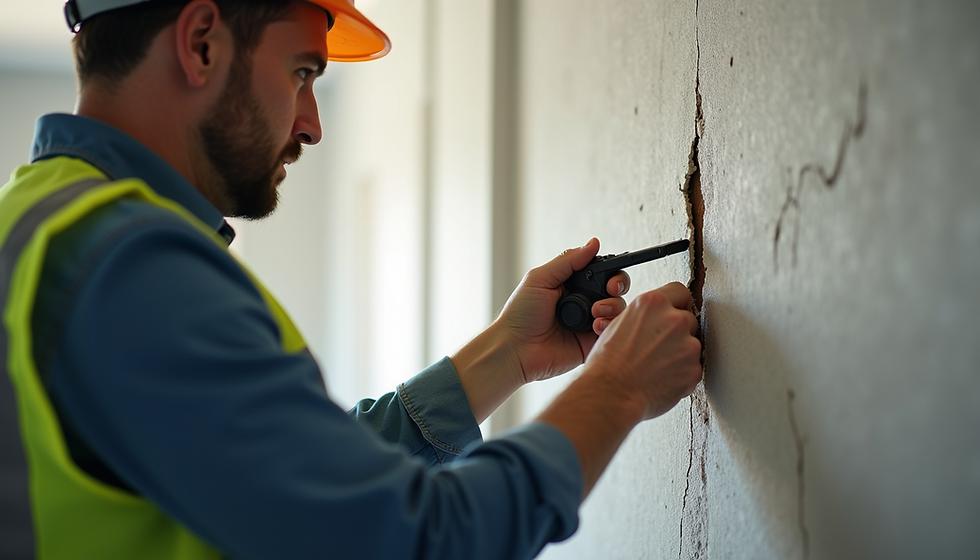Tips for Ensuring Your Commercial Property Is Inspection Ready
- John Gallagher
- Aug 6, 2025
- 3 min read
Preparing a commercial property for inspection can feel overwhelming. However, with the right approach, you can make the process smooth and efficient. Inspections are crucial for maintaining safety, compliance, and value. Whether you own an office building, retail space, or industrial facility, being inspection ready protects your investment and helps avoid costly surprises.
Preparing Your Commercial Property for Inspection
Start by conducting a thorough self-assessment of your property. Walk through every area and take notes on potential issues. Focus on common inspection points such as structural integrity, electrical systems, plumbing, HVAC, and fire safety equipment.
Key steps to prepare:
Clean and declutter: A tidy space allows inspectors to access all areas easily.
Repair visible damage: Fix cracks, leaks, or broken fixtures before the inspection.
Check safety features: Ensure fire extinguishers, alarms, and emergency exits are functional and clearly marked.
Review documentation: Have maintenance records, permits, and previous inspection reports ready.
Taking these steps early reduces stress and demonstrates your commitment to property upkeep.

Essential Maintenance Tips for Commercial Property Inspections
Regular maintenance is the backbone of a successful inspection. Neglecting routine tasks can lead to violations or costly repairs. Here are some practical maintenance tips to keep your property inspection ready year-round:
Roof and Exterior: Inspect for leaks, damaged shingles, or cracks in walls. Clear gutters and downspouts to prevent water damage.
Electrical Systems: Test outlets, switches, and circuit breakers. Replace frayed wires and ensure all panels are labeled.
Plumbing: Check for leaks, corrosion, and water pressure issues. Clean drains and test backflow preventers.
HVAC: Schedule professional servicing to maintain air quality and system efficiency.
Fire Safety: Replace expired extinguishers, test smoke detectors, and verify sprinkler system functionality.
Document all maintenance activities. This record can be invaluable during inspections and when addressing any concerns raised.

What is the difference between a home inspection and a commercial inspection?
Understanding the distinction between home and commercial inspections helps you better prepare your property. While both inspections assess safety and condition, commercial inspections are generally more complex due to the size, usage, and regulatory requirements of commercial buildings.
Differences include:
Scope: Commercial inspections cover larger systems such as elevators, fire suppression, and specialized electrical setups.
Regulations: Commercial properties must comply with stricter building codes, zoning laws, and accessibility standards.
Purpose: Commercial inspections often focus on operational safety and compliance for tenants and customers, not just structural soundness.
Duration: Commercial inspections typically take longer due to the complexity and size of the property.
Hiring a qualified commercial inspector ensures all relevant aspects are thoroughly evaluated.

How to Choose the Right Commercial Property Inspection Company
Selecting the right inspection company is critical for a successful inspection. Look for professionals with experience in commercial properties similar to yours. Here are some tips to guide your choice:
Check credentials: Verify certifications, and insurance.
Ask for references: Speak with past clients to learn about their experience.
Review services: Ensure the inspector covers all necessary areas such as structural, mechanical, and safety systems.
Request a sample report: This helps you understand the level of detail and clarity you can expect.
Compare pricing: Get quotes from multiple inspectors but avoid choosing solely based on cost.
Understand the Standards: Is the inspection company utilizing the ASTM 2018E-24 reporting standard? Will you get cost estimates for immediate cost and future cost needs for the property?
A reputable company will provide a comprehensive report that helps you address issues proactively.
Preparing for the Day of the Inspection
On the inspection day, your goal is to facilitate a smooth process. Here are some practical tips:
Provide access: Ensure all areas, including basements, rooftops, and mechanical rooms, are accessible.
Be available: Stay on-site or reachable to answer questions or provide documentation.
Inform tenants: Notify occupants about the inspection schedule to minimize disruptions.
Remove obstacles: Clear hallways, stairwells, and entrances.
Have documentation ready: Include maintenance logs, permits, any building drawings, and previous inspection reports.
Being organized and cooperative helps the inspector complete their work efficiently and may lead to a more favorable outcome.
Final Thoughts on Keeping Your Commercial Property Inspection Ready
Regular preparation and maintenance are key to keeping your commercial property inspection ready. By addressing issues early, maintaining detailed records, and working with qualified inspectors, you protect your investment and ensure safety for all occupants.
For professional assistance, consider scheduling commercial property inspections with experienced experts who understand the unique needs of commercial buildings.
Taking these proactive steps will give you peace of mind and help your property meet all inspection requirements with confidence.




Comments